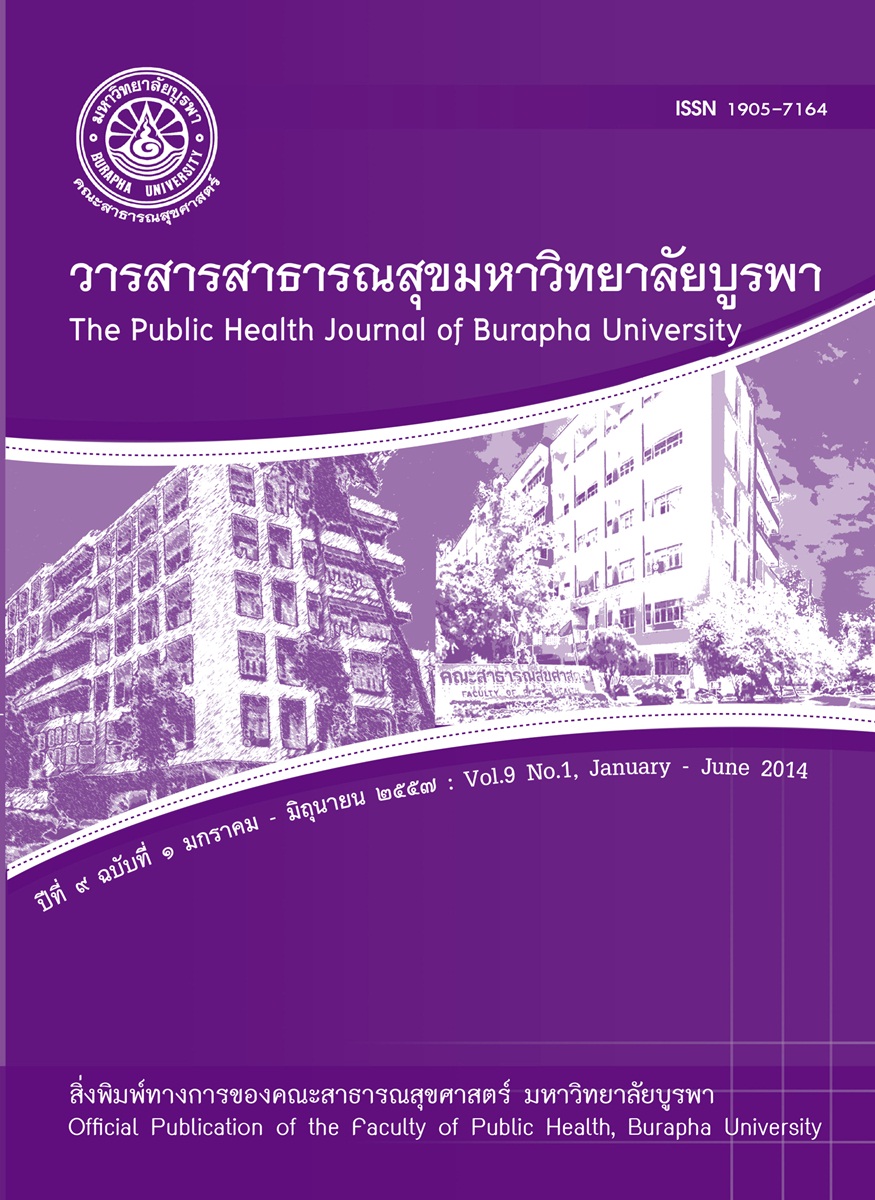ผลของการใช้โปรแกรมเสริมสร้างความรู้และทักษะการดูแลผู้ป่วยโรคปอดอุดกั้นเรื้อรังที่บ้านในอาสาสมัครสาธารณสุขชุมชน
Main Article Content
บทคัดย่อ
การวิจัยนี้มีวัตถุประสงค์เพื่อศึกษาผลของการใช้โปรแกรมเสริมสร้างความรู้และทักษะการดูแลผู้ป่วยโรคปอดอุดกั้นเรื้อรังที่บ้านในอาสาสมัครสาธารณสุขชุมชน กลุ่มตัวอย่างเป็นอาสาสมัครสาธารณสุขชุมชนที่ปฏิบัติงานในตำบลทุ่งสุขลา อำเภอศรีราชา จังหวัดชลบุรี จำนวน 24 คนได้รับการเสริมสร้างความรู้และทักษะการดูแลผู้ป่วยโรคปอดอุดกั้นเรื้อรังที่บ้านตามขั้นตอนของโปรแกรมโดยจัดกิจกรรมกลุ่มด้วยกระบวนการเรียนรู้แบบมีส่วนร่วม 4 สัปดาห์ นำประสบการณ์ที่ได้รับไปฝึกทบทวนด้วยตนเองที่บ้าน 3 สัปดาห์ และประเมินผลระยะติดตามในสัปดาห์ที่ 8 เก็บรวบรวมข้อมูลโดยใช้แบบสัมภาษณ์ข้อมูลทั่วไป แบบวัดความรู้ การรับรู้ความสามารถตนเอง แบบประเมินทักษะ การดูแลผู้ป่วยโรคปอดอุดกั้นเรื้อรังที่บ้าน และแบบสอบถามความพึงพอใจของผู้ป่วยต่อการดูแล สถิติที่ใช้ในการวิเคราะห์ข้อมูล คือ การแจกแจงความถี่ ร้อยละ ค่าเฉลี่ย ส่วนเบี่ยงเบนมาตรฐาน การวิเคราะห์ความแตกต่างของค่าเฉลี่ย ด้วยสถิติ Dependent t-test วิเคราะห์ความแปรปรวนแบบวัดซ้ำภายในกลุ่ม ผลการวิจัยพบว่าค่าเฉลี่ยคะแนนความรู้ และค่าเฉลี่ยคะแนนการรับรู้ความสามารถตนเองหลังเข้าร่วมโปรแกรมเสร็จสิ้นทันที และระยะติดตามผล ของอาสาสมัครสาธารณสุขชุมชนสูงกว่าก่อนเข้าร่วมโปรแกรม อย่างมีนัยสำคัญทางสถิติ (p<.05) และในระยะติดตามผล ไม่แตกต่างจากหลังเข้าร่วมโปรแกรมเสร็จสิ้นทันที ที่ระดับนัยสำคัญทางสถิติ .05 ส่วนค่าเฉลี่ยคะแนนทักษะการดูแลผู้ป่วยโรคปอดอุดกั้นเรื้อรั้งที่บ้านหลังเข้าร่วมโปรแกรมเสร็จสิ้นทันทีอยู่ในเกณฑ์ดี และไม่แตกต่างจากระยะติดตามผล ที่ระดับนัยสำคัญทางสถิติ .05 นอกจากนี้ยังพบว่าผู้ป่วยโรคปอดอุดกั้นเรื้อรังมีคะแนนเฉลี่ยความพึงพอใจอยู่ในระดับสูง ผลการวิจัยนี้มีข้อเสนอแนะว่า การพัฒนาศักยภาพของอาสาสมัครสาธารณสุขชุมชนในการดูแลผู้ป่วยโรคปอดอุดกั้นเรื้อรังที่ยั่งยืนนั้นควรเน้นการเสริมสร้างความรู้ที่ยึดตามปัญหาของพื้นที่ และติดตามจากเจ้าหน้าที่สุขภาพ
Effects of Knowledge and Skills Enhancing Program for Home-based COPD-Patient Care among Community Health Volunteers
The purpose of the study was to determine effects of knowledge and skills enhancing program for home-based COPD-patient care among community health volunteers in Tambon Tungsukhla, Sriracha District, Chon Buri Province. The study sample was consisted of 24 community health volunteers. The participants received a 4-week program through participatory learning process, self-skill training at home for 3 weeks, and evaluation at the follow up period (the 8 thweek). The instruments for data collection were interview questionnaires which included demographic data, knowledge, perceived self-efficacy, skills in COPD-patient care and patient satisfaction. The statistics for data analysis were frequency, percentage, mean, standard deviation, dependent-t test, and repeated measure ANOVA. The findings showed that the mean scores of knowledge and perceived self-efficacy at the end of the program and at follow up period were significantly higher than the mean scores at the beginning (p<.05). However, no significant difference in mean scores of knowledge and perceived self-efficacy was detected between the end of the program and at follow up period. After receiving the program, the community health volunteers had mean scores of skills at good level and there was no significant difference between after receiving program and follow up period. Moreover, the COPD-patients receiving home visit by community health volunteers reported a mean score of satisfaction at high level. This finding suggests that the development of competency of chronic care in community health volunteers should be addressed by focusing on area-based problem, and monitoring of health care personals.

